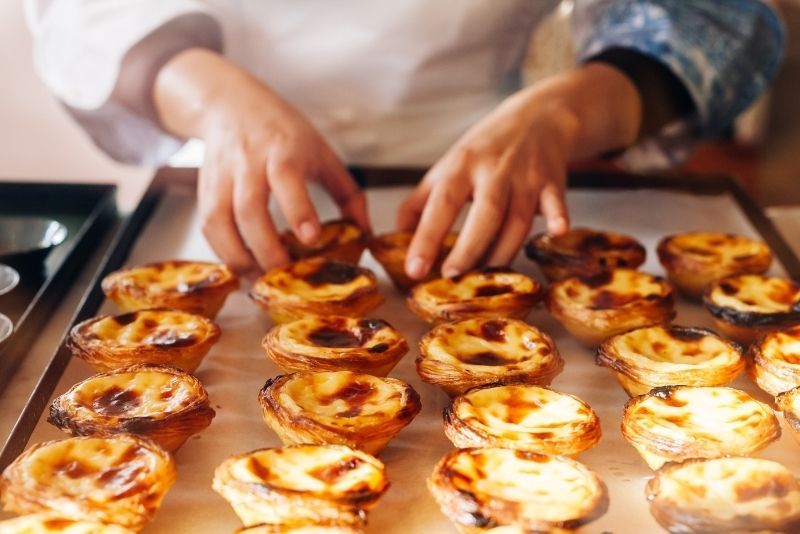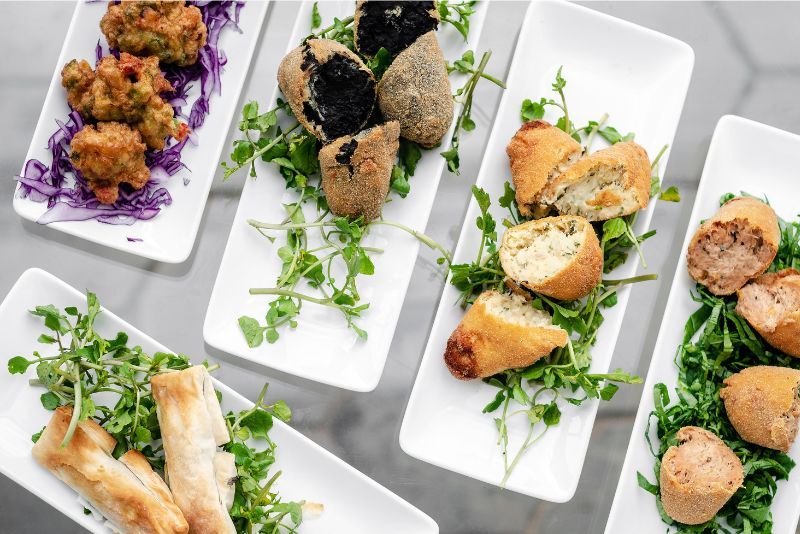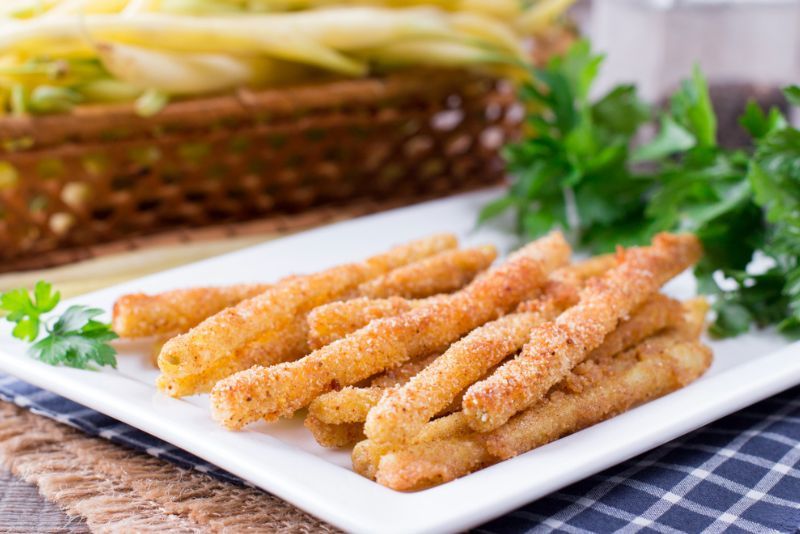Cooking Classes in Lisbon
Lisbon draws waves of tourists each year to explore its colorful neighborhoods, brilliant waterfronts and crenelated Belem Tower. Every visitor must eat, so why not turn a necessity into an afternoon or evening you’ll never forget? Cooking classes in Lisbon regale you with a Portuguese cultural experience that may be the highlight of your trip.

Up next, you can check out our guide on booking cooking classes, one of the most captivating gastronomic experiences in Lisbon.
What are the best cooking classes in Lisbon?
Pastel de Nata cooking classes
Portugal’s legendary pastel de nata is baked custard tart. The sunshine-colored treat is a must-try for any visitor to Lisbon. Even better, learn to make it yourself, and you can relive your Portuguese moments in your home kitchen.
Petiscos cooking classes

“Petiscos” are Portugal’s answer to Spanish tapas. With similar flavors but versions all their own, take a “petiscos” cooking class to learn up to five recipes in a short period of time. You’ll end up with a spread of local delicacies that can serve as a light meal.
Portuguese cooking classes
Make a full meal, from starter to dessert, in the company of like-minded travelers and charismatic instructors. Settle in with wine and snacks to start, and you and your team of classmates will put together a copious multi-course meal that may even provide you leftovers.
Cooking class with market visit
Follow a chef/instructor through neighborhood markets to select the freshest ingredients. You’ll plan the meal together according to what’s in season. Head to the chef’s home kitchen or to a cooking school to assemble and savor a meal full of new flavors.
Private cooking classes
Private cooking classes in Lisbon are intimate and don’t cost much more than a group lesson. Choose a class where your instructor will lead you through the steps to make a three-course meal, either at a cooking school or in a home kitchen. For the most enriching Portuguese experience, book a private class with a market visit.
How do cooking classes work?

No matter your choice of class, you will prepare between one and five dishes while sampling local wines, beers and liquors. Take in your instructor’s skills and stories while you and your classmates cook and share a delicious meal.
In “pastel de nata” classes, you’ll form puff pastry shells and fill them with a creamy mixture to bake. Most classes have you fry up some “bacalhau” fritters for a nice savory snack while you wait for the “pasteis”.
Other cooking classes have many dishes in common. “Petiscos” make great starters for three-course meals. You’ll likely stir up some “caldo verde” soup and make the delightful fried green beans called “peixinhos da horta” or “little fish from the garden.”
Your main dish will be meat- or fish-based. Prep some ribs or put together a pork and clam “cataplana,” similar to a paella. Tuck into a fish casserole that you helped make, and save room for dessert. Common sweets are rolled orange cake, meringues in custard and ring-shaped Portuguese flan.
What are the prices of cooking classes in Lisbon?
“Pastel de Nata” cooking classes cost between €50 per person and €70 per person. Most classes also teach you to create cod fritters, and you can eat everything that you prepare. The most expensive “pastel de nata” classes are held in a celebrated bakery, and hosted by their pastry chefs.
“Petiscos” and Portuguese cooking classes cost around €80 per person. In “petiscos” classes, you will concoct up to five different appetizers that can serve as a small meal. Generally, classes held in home kitchens cost less than those at cooking schools.
Group cooking classes with market tours cost around €90 per person, and you will create three courses from whatever the best looking produce, fish and meat you will find during your shopping trip.
Private cooking classes cost between €80 per person and €175 per person. Price differences depend on the amount of courses you prepare and whether the class is held in a home kitchen or a cooking school. The most expensive classes provide you with door-to-door transportation from your lodging in Lisbon.
What is included in the price?
Included in your cooking class are drinks, instruction, food and recipes to take home. Most classes serve Portuguese wine, beer, coffee, tea and water.
In most classes, you’ll prepare and eat at least two dishes. In Portuguese 3-course cooking classes, typically there are students working at several cooking stations that enable a class of eight to 15 people to enjoy much more than three courses.
Where do cooking classes take place?
Classes are held either at centrally-located cooking schools in Lisbon or in private homes. Most hosts will send you their address after booking a home cooking lesson. They will often escort you to and from public transportation to save you time navigating.
What is the typical duration?
Pastel de Nata classes are 1.5 to 2 hours long. Portuguese and “petiscos” cooking classes last 3 to 4 hours. Classes that include a market visit last 4 to 6 hours.
Are cooking classes wheelchair friendly?
Cooking classes held in private homes and those that include market visits are not wheelchair friendly. However, classes held at cooking schools advertise being wheelchair friendly. Verify that your needs will be met at the time of booking.
When is the best time for cooking classes in Lisbon?
While cooking classes can be enjoyed year-round, the best time for one in Lisbon is in the spring (March to June) and summer (July to August), when you can use fresh, local ingredients as a variety of produce is in season.
What other gastronomic experiences can you enjoy in Lisbon?
Travel tips
- Cooking classes can fill up quickly, particularly those that are well-reviewed or unique. It's a good idea to book your class well in advance to secure your spot.
- You'll most likely be eating the food you prepare, so make sure to arrive with an appetite.
- Make sure to wear comfortable clothes and shoes as you may be standing for a long period.